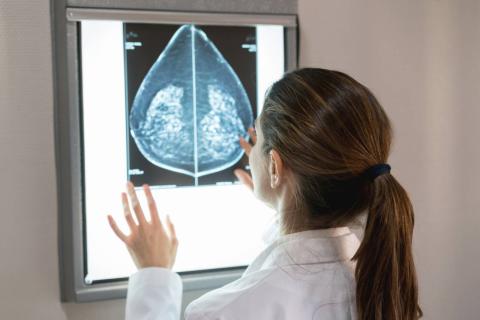Reactions: review highlights lack of menopause studies
A review published in the journal Cell highlights the "urgent need" for more studies on the menopause - and at an international level, so that the results can be applied to all countries. The article, published by a research team in Australia, the US and Italy, summarises the available evidence on the biology of the menopause, its consequences for women and therapeutic options. It highlights the lack of studies in certain areas, for example on the efficacy of non-oral oestradiol, or on the efficacy and safety of hormone therapies during the perimenopause.

Menopausia - Antonio Cano (EN)
Antonio Cano
Professor of Obstetrics and Gynaecology in the Department of Paediatrics, Obstetrics and Gynaecology
This review provides an update on the biological determinants, symptomatic impact and health threats of menopause. The quality of the study is high, as it updates the scientific evidence on a universal phenomenon for women, with variants including primary ovarian insufficiency, also called early menopause, and surgical menopause.
As features to highlight, the article draws attention to the prevalence of the phenomenon, which occurs at an early age considering the current life expectancy of women globally, not only in developed countries' societies.
The biological basis is the programming of the ovary to cease its hormonal activity at a time that now, not in the past when life expectancy was shorter, is mid-life. The abrupt loss of the main ovarian hormone, oestrogen, has a number of implications for different organs and systems, as oestrogen receptors are distributed in most tissues of the body. Therefore, in addition to genital symptoms, essentially atrophy of the vaginal mucosa and in part of the vulvar epithelium, there are bone effects (postmenopausal osteoporosis), cardiovascular effects (acceleration of arteriosclerosis, with impact on coronary heart disease and stroke, and the very frequent vasomotor symptoms, the so-called hot flushes), cerebral (brain fog, mood alterations), sleep disorders, changes in weight and body structure, etc., which means a deterioration in the quality of life of many women.
This set of symptoms and biological changes do not occur in all women and, when they do, they do not occur to the same extent, but they make up an entity that has received little attention, so that a large part of the pathophysiology is still unknown. All this is well described and supported by current scientific evidence in the article by Susan Davis and colleagues.
The article provides an excellent update, with the latest evidence is reflected in each section. The authors, Professors Davis, Pinkerton, Santoro and Simoncini are at the forefront [of this research field] worldwide. They have provided a thoughtful analysis of many issues that have been treated with much confusion over the years, largely because the evidence has been misinterpreted by many physicians, and because of the lack of training of physicians, particularly those specialising in gynaecology or endocrinology. Specialists in training touch very casually on these issues and lack solid training on the subject, which has a negative impact on the care given to patients. This is now a priority issue in scientific societies such as the European Menopause and Andropause Society (EMAS). A frequent confounding factor in these assessments is the effect of age, which overlaps with the hormonal effect itself.
This is a practical issue of universal concern in the field of women's health. It should be required reading for health professionals in clinical practice. There is a wide range of solutions available, including healthy lifestyle habits or, if necessary, drugs, where hormone therapy stands out, or other drugs mentioned in the article, such as selective oestrogen receptor modulators, complementary alternative therapies such as cognitive behavioural therapy, or psychotropic drugs, such as selective serotonin reuptake inhibitors.
Of note is the recent emergence of neurokinin receptor antagonists, which constitute a specific non-hormonal therapy for vasomotor symptoms. Fezolinetant, the first drug to be marketed in this field, is a therapeutic novelty because of its efficacy, even in areas other than hot flushes, such as sleep or quality of life, and because it is the first marketed drug from a new therapeutic group. It is of particular interest to women who cannot take hormone therapy, such as breast cancer survivors, or who do not wish to do so, because they reject the option of using them, or because of adverse effects such as bleeding or other symptoms.
I have been President of the European Menopause and Andropause Society (EMAS) between 2019 and 2021, and I participate in training activities, advisory boards, or steering committees of multinational pharmaceutical companies such as Viatris, Theramex, or Astellas.
Menopausia - Pluvio Coronado (EN)
Pluvio Coronado
professor of Obstetrics and Gynaecology at the Universidad Complutense de Madrid, president of the Spanish Association for the Study of Menopause (AEEM)
This review aggregates the evidence of more than half a century and is generally quite good and accurate. It is of high quality and its conclusions are well supported by previously published data. Obviously, not all the data provided are solid because much remains to be known, both about the effects of menopause on women's bodies and about therapies to alleviate the effects and symptoms of menopause.
This work sums up everything that has been published previously. It does not provide more value than what we already know and only refreshes some topics such as the definition of menopause, the diagnosis of the stages, the metabolic effect of hormones on the body or the possible therapies and their evidence to alleviate the symptoms of menopause. The review includes the latest studies published this year. It also addresses a current issue: the impact of menopausal symptoms on the working environment and quality of life.
As it is a review, only the limitations of the studies analysed have been checked, including the famous WHI [Women's Health Initiative] study, which has revolutionised the hormonal treatment of menopause, but with the limitations mentioned above. The most important limitation of the entire review is that the available therapies still need more studies due to the multiple formulations and, above all, that they need to be carried out over longer periods. What the authors have made clear is that the most effective therapy is hormonal therapy, which, when individualised, has more benefits than risks.
The implications for users and for the healthcare community are that menopause, although natural, alters the quality of life and worsens the survival of women due to the implications it has on their body. Good counselling, individualisation and appropriate therapy for each case guarantee an improvement in women's health during menopause. On the other hand, this study highlights the interest that this stage, common to all women, has for society and the National Health System.
Menopausia - Esther de la Viuda EN
Esther de la Viuda
Especialista del servicio de Ginecología y Obstetricia del Hospital Universitario de Guadalajara, Profesora Asociada en Ciencias de la Salud en la Universidad de Alcalá
The study is good, the authors are well-known professionals with extensive experience. A good and extensive literature review has been done. In relation to the solidity of the data, obviously we would always like to have more clinical trials and quality studies to establish the conclusions of any work, but we have to work with the best available evidence. In this sense, a rigorous and extensive review has been carried out here, and the data presented are supported by these studies.
The information provided is consistent with what we know and with the current recommendations of scientific societies. It adequately positions menopausal hormone therapy as the best option for vasomotor symptomatology, with its benefits and risks; it deals with another important problem of this period, vaginal health; and it raises social situations such as the effect of symptoms on working life.
This is a review, the limitations of the WHI [Women's Health Initiative] study have been considered and the different therapies, such as androgen therapy or non-hormonal options, have also been discussed. Finally, the need for further studies is acknowledged.
[I think that the] publication of this type of article is important to make menopause more visible, to inform that - although it is another stage of life and it is natural - many women present vasomotor symptoms or genitourinary syndrome, which affects their quality of life in an important way, and that this can be solved effectively and safely with the current available treatments, approved by the drug agencies, always individualising the woman and insisting on the recommendations on lifestyle.
Susan R. Davis et al.
- Review
- Peer reviewed



